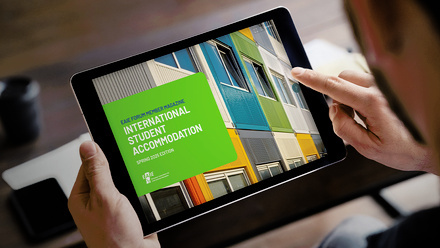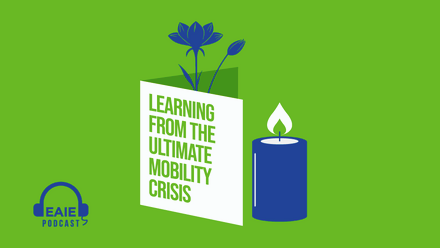Future-proofing your mobility checklists

Behind every good Mobility/International Student Advisor, there is a trusty checklist! The checklist is an essential tool used to ensure students move in a smooth and well-informed way through each stage of the international student lifecycle. However, with the world turned upside down since early 2020, our checklists have had to be carefully reviewed and updated at pace! Here we offer some of the key checklist changes needed to provide the best support to mobile students (degree-seeking and exchange) through the first few stages of the student lifecycle.
Bases to cover at the recruitment and ‘conversion’ stage
At a time of global volatility, students and their parents/supporters are understandably anxious to learn as much as possible about the student experience at the study destination. This can be particularly challenging, given that the recruitment cycle can begin up to a year in advance of the start date, when the details of the offer can still be unclear. To navigate this complexity, advisors must ensure honesty and accuracy about what can and what cannot be anticipated, while managing the hopes and fears of students and parents through regular contact with international partner institutions, international networks, agents and student recruitment officers.
Staff from the academic departments, Accommodation Office, Wellbeing Services, Student Funding, and the International Office can all contribute to address students’ queries. Student ambassadors can also offer huge support, so advisors might want to involve them in direct social media campaigns and digital marketing opportunities, including virtual recruitment fairs, as well as individual or group calls with prospective students. For outbound student exchanges, arrange on-line meetings with your students who are already on exchange and can share insights and helpful tips from abroad.
For the pre-departure/pre-arrival “to do” list
Mobility and international student advisors now need to be aware that constant changes to public health regulations mean students need greater reassurance right up until their arrival at their study destination. Students want greater flexibility regarding withdrawal of application, as the pandemic may affect their ability and appetite for international travel, as well as over arrival dates and modalities of access to their studies, as visa procedures may take longer.
Constant changes to public health regulations mean students need greater reassurance right up until their arrival at their study destination.
To address this need, it’s important to offer the most current information on the deadlines for enrolment and physical arrival (normally set by senior academic leadership, but also frequently determined by national immigration rules), and clarify the mode of delivery of teaching. Once your university is clear on these points, you can help to manage expectations via increased use of webinars and live chats – effectively frontloading your orientation programme.
Outbound exchange students should be informed of all criteria and conditions that make going abroad possible (or not) and key deadlines. Links to your government website on COVID-19 ensure students can access the latest guidance on restrictions at home and abroad, including travel test requirements, self-isolation/quarantine rules and any financial implications.
On arrival: key reminders
In order to provide good academic and pastoral support and student safety, decisions will need to be taken about policy and budget. Keep in mind that stakeholder management with a broader cross-section of staff is normally required for anything additional to the standard offer and note that you will need to think of not only new but also returning international degree and exchange students.
Since some students may start the academic year remotely, processes for enrolment and academic engagement monitoring may have to be reconsidered. Visa support responsibilities may need to be managed differently, as you may be asked to provide data on students who have arrived and completed all visa checks, but also on those who are yet to arrive.
Advisors may find it increasingly helpful to coordinate with operational and human resources actors on all practical aspects of inbound students’ journey, including airport collection services and accommodation. You’ll want to ensure that your processes will work effectively for those students who arrive later in the term/semester, as delays and late arrivals are likely to be the norm.
You’ll want to ensure that your processes will work effectively for those students who arrive later in the term/semester, as delays and late arrivals are likely to be the norm.
Public health rules now require extra planning and coordination. Information on extra financial costs to comply with self-isolation requirements should be made available upfront. And in order to enable students to comply with such mandates, accommodation arrangements must be in place prior to the normal start of the academic year. On arrival checklists should cover all key requirements necessary to ensure safe communal living during a pandemic, eg. provision of food, medicines and postal deliveries etc to self-isolating students.
Welcome/Orientation programmes, as well as academic inductions, may have to be offered not only in their standard fashion, but also in online versions for students who cannot attend in person. Intake for social activities such as student societies and sports clubs should be extended, to ensure that all students have opportunities to make connections and friendships.
Let’s not forget student support
Offering helpful guidance on positivity and self-care during uncertain times is crucial. Peer-advice among students is important, and so is the expert guidance of student wellbeing staff. Consider increasing the amount of ‘temperature taking’ you do with your students, such as via regular focus groups to help you understand students’ feelings and show them you are actively listening. Online quizzes (using platforms like Mentimeter, Nearpod, or Vevox) can be fun and interactive ways to communicate key messages. Ensure that students are updated on the latest COVID-19 national developments in your region and the potential implications for travel and immigration.
Consider increasing the amount of ‘temperature taking’ you do with your students, such as via regular focus groups to help you understand students’ feelings and show them you are actively listening.
Check in regularly with your outbound exchange students right from their arrival at destination, to monitor their wellbeing and show them the continued support of their home institution (this can also give you an up-to-date understanding of the COVID-19 situation in the host country/host institution). Remind them that they need to keep themselves informed about the COVID-19 situation in both their home and host countries. Ask them to keep both their next of kin and their home institution informed about their situation.
Rolling with – and learning – from change
Nearly two years into the pandemic, we continue to find ourselves surrounded by uncertainty, with the potential for volatility and change to persist for several years to come. Being ready to meet whatever challenge might arise will be crucial: therefore, it will continue to be necessary for our mobility checklists to be both comprehensive and flexible. The unprecedented changes and their impact on student mobility have taught all mobility/international student advisors valuable lessons on how to pivot and how to prioritise. Most of all, they have also shown us how adaptable and resilient everyone involved in the mobility and international study experience can be: our students, our institutions and ourselves.






